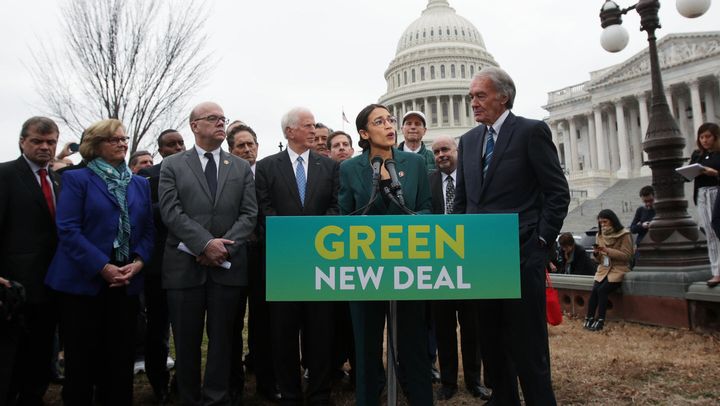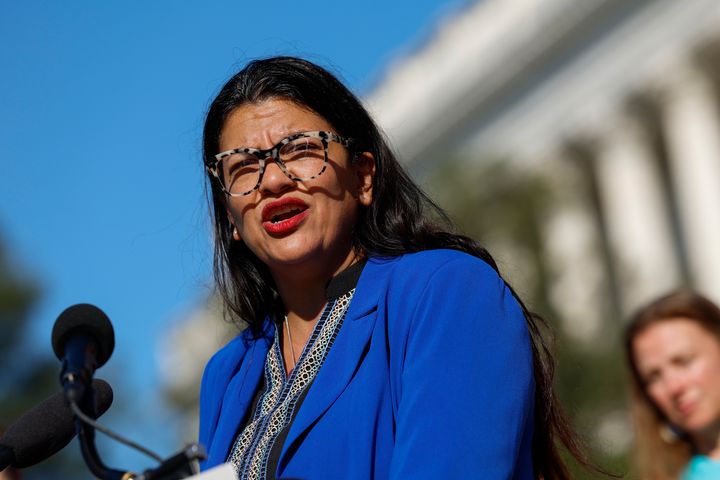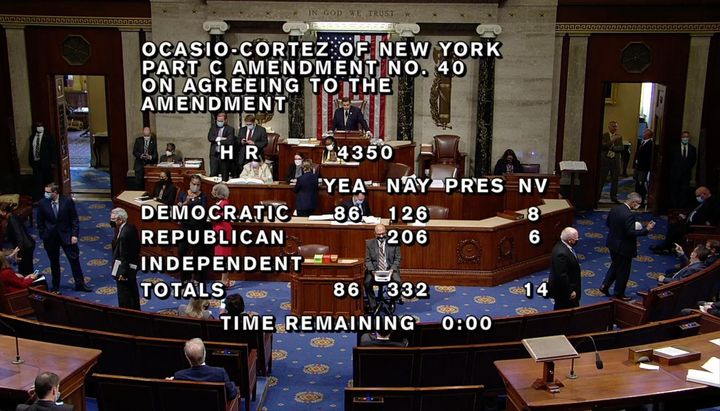House Democrats who so far have declined to co-sponsor Rep. Alexandria Ocasio-Cortez’s (D-N.Y.) Green New Deal bill took, on average, 2.8 times more money from oil and gas PACs and individuals who work in the industry during the 2018 election than those co-sponsoring it, according to a Sludge analysis of campaign finance data compiled by the Center for Responsive Politics.
The bill, which currently has 68 Democratic co-sponsors, calls for a 10-year national mobilization to achieve net-zero greenhouse gas emissions, create millions of high-paying jobs, prevent oppression of “frontline and vulnerable communities,” and secure the environment for generations to come. Support for a Green New Deal has become a rallying cry for people and groups that are concerned about the catastrophic environmental impacts that scientists have repeatedly said are likely to lead to mass human casualties in the coming decades unless drastic action is taken immediately.
“The Green New Deal is our generation’s last and best hope at avoiding climate catastrophe in our lifetimes,” said Stephen O’Hanlon, communications director for the Sunrise Movement, an environmental activist group. “Any politician with a conscience will stand up to the fossil fuel lobby and back it.”
While Ocasio-Cortez has received support from many of her fellow freshman Democrats who were elected in the “blue wave” of 2018, as well as some progressives who have been in the House a lot longer, many top-ranking Democrats have either ignored or dismissed her bill.
“The green dream, or whatever they call it, nobody knows what it is, but they’re for it, right?” House Speaker Nancy Pelosi (D-Calif.) said when asked about the bill by reporters earlier this month. Pelosi, who is not co-sponsoring the bill, has received $117,065 in campaign contributions from PACs and individuals affiliated with the oil and gas industry over the course of her career. PACs in the broader energy and natural resources sector, including those affiliated with Pacific Gas and Electric, Duke Energy, and Occidental Petroleum, have given her $278,700 since 1998.
Steny Hoyer (D-Md.), the majority whip and second highest-ranking Democrat in the House, was involved in a decision to withhold legislative and subpoena powers from the new Select Committee on the Climate Crisis—which Democratic leaders created in lieu of the Green New Deal committee that progressive had called for—instead making it a mere “recommendary committee.” Hoyer has taken $409,470 in campaign contributions from PACs and individuals affiliated with the oil and gas industry over the course of his career, including $43,750 in the 2018 election cycle. Hoyer’s top donor in the 2018 election was Exelon, a massive energy company that operates dozens of fossil fuel plants in the U.S.
In all, none of the top 25 Democratic recipients of oil- and gas-linked money in the 2018 election are among the 69 Democrats sponsoring the Green New Deal bill. The average amount of oil and gas money received in the 2018 cycle by Democrats co-sponsoring the Green New Deal bill is $3,288, while the average received by those not co-sponsoring the bill is $10,742.
“It’s no surprise that some of the most vocal opponents to the Green New Deal in Congress are some of the individuals who have taken the most money from oil and gas CEOs and lobbyists,” said O’Hanlon. “Fossil fuel CEOs see the Green New Deal as an existential threat to their continued profit, and they are doing everything in their power to fight the Green New Deal tooth and nail.”
The oil and gas industry figures provided by the Center for Responsive Politics include contributions from PACs affiliated with oil and gas companies and trade groups, as well as employees of oil and gas companies who gave more than $200. “Generally, people who give above $200 are not the rank and file office staff; they are the higher level vice presidents and CEOs of the corporations, Center for Responsive Politics Research Director Sarah Bryner told Sludge.”
Rep. Henry Cuellar (D-Texas), the House Democrat who received the most oil and gas money in the 2018 election, $165,900, told Politico in November that Democrats should act with moderation on climate change to protect conservatives in the party. “A lot of the Republican seats that we won—a lot of them are moderate, conservative Democrats, and we have to keep that in mind. Those are the people I’m concerned about,” Cuellar said. “We can’t go too extreme.”
Cuellar took the maximum donation of $10,000 from PACs affiliated with several oil and gas interests in the 2018 cycle, including ConocoPhillips, Marathon Petroleum, and Exxon Mobil.
Frank Pallone (D-N.J.), the chairman of the Energy and Commerce Committee, which the Green New Deal bill has been referred to, has not thrown his support behind the proposal despite saying that he agrees it’s important to get to a carbon-neutral economy eventually. “The Green New Deal says you can do it in 10 years. I don’t know if that’s technologically feasible…Beyond that, it’s probably not politically feasible,” Palone said recently, according to the Asbury Park Press.
Pallone received $30,900 from oil and gas interests in the 2018 election, including contributions from PACs affiliated with the American Gas Association and Phillips 66.
In November, activists with the Sunrise Movement protested at Pallone’s office and urged him to commit to the Green New Deal, but Pallone dodged. “We pushed him over and over again to back Ocasio-Cortez’s Select Committee for a Green New Deal,” Sunrise Movement co-founder Varshini Prakash told Sludge at the time. “Over and over again, he flipped and tried to not give us an answer on it. We asked him, ‘OK, if you’re really with us, we need proof. Will you take the No Fossil Fuel Money Pledge?’ And he said ‘no’ repeatedly to our face and that perhaps later he’d consider it.”
Campaign finance isn’t the only area of conflict among Democrats when it comes to energy and natural resources. As Sludge has previously reported, a number of House and Senate members on key environment and energy committees, including Pallone, are personally invested in the fossil fuel industry.
Related:



